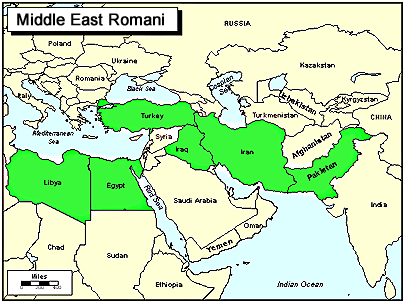The Middle East Romani are made up of two groups: the Ghorbati and the Nawari. Both groups speak a dialect of Romany, which is related to the North Indo-Aryan language of India. Their dialect, Domari, contains many Arabic words.
Romani call themselves Rom, which in their language means "men." Rom is derived from the Indian word Dom, meaning "a man of low caste who gains his livelihood by singing and dancing." The Ghorbati are named from the Arabic word, gurbet, which means "stranger." In the Arab world, Romani are called Nauar, hence the Nawari Romani.
Romani originated in Punjab, India (Including Pakistan and Bangladesh) where they worked as musicians, entertainers and metal workers. There they were discriminated against and excluded from the temples. Later, they were sent to Persia as minstrels. From there they were separated into two groups. One traveled northward and became the Romany-speaking European Romani. The other traveled southward and became known as the Domari, or Middle Eastern Romani. Those who remain in Pakistan often live in Punjab's Cholistan Desert or in the city of Lahore. Their almost mystical lifestyle has made them the objects of curiosity, distrust, and even fear from their beginnings until now.
In Pakistan there is a Romani community in Punjab's Cholistan Desert. They want to settle down, but it would require clean running water and electricity. The government needs to provide the infrastructure for these needs. The government isn't motivated to help them since the Romani are usually barred from voting due to a number of restrictions.
As it stands, these Romani people live either in tents or simple brick homes in the desert. They have carts that they use to bring their wares to markets. These might be bangles, cloth, shoes, kitchen utensils, or products made by the men. Many also sing and dance. Both men and women shear sheep, spin wool, and tell fortunes. Sadly, some of the women and children are forced to beg or even steal food as a means of survival.
Romani marriages usually take place between couples in their teens. Though polygyny (having more than one wife) is sometimes practiced, it is rare. The family unit is highly valued because each member is depended on for his financial contribution.
Typically, Romani have very unclean living habits due to their nomadic lifestyle. Sanitation and good hygiene are rarely practiced. Children are often poorly cared for; their hair hangs loosely and shoes are seldom worn. Their wagons or carts are used as living units and shops as well as for transportation, which contributes to their unsanitary lifestyle.
Values such as justice, fidelity, and morality are very significant in Romani society. Such things as courtesy and friendliness are also very important. The control of deviants is strictly enforced. If a Romani becomes impure by some immoral or unlawful act, he is considered an outcast. Also, sexual purity is considered a must for young women.
The Middle East Romani are almost entirely Muslim and they follow the practices and beliefs of the Islamic faith. However, there are a few who have held on to the traditional beliefs of the Romani. For example, they believe that ghosts, lizards and snakes are capable of harming humans. They also believe that men have the power to curse others by giving them the "evil eye," and that some people have the power to heal the sick.
The unsanitary lifestyle of the Middle East Romani has created many physical needs. The quality of health care, nutrition, housing, and education is poor. Adequate educational opportunities must be provided in order to raise their standard of living.
Spiritually, the Islamic religion is very difficult to influence. Their nomadic lifestyle has made it very difficult for missionaries to reach them. Also, their reputation as beggars and thieves has made them undesirable candidates for outreach.
Ask the Lord to call people who are willing to share Christ with the Romani.
Ask God to strengthen, encourage, and protect the small number of Romani Christians.
Pray that those Romani who know Christ will be bold witnesses of the Gospel to their own people.
Ask the Holy Spirit to soften the hearts of Romani towards Christians so that they will be receptive to the gospel.
Pray that God will raise up intercessors who will stand in the gap for them.
Ask the Lord to raise up strong local churches that plant more churches among the Romani in Pakistan.
Scripture Prayers for the Romani, Vlax in Pakistan.
https://pmc.ncbi.nlm.nih.gov/articles/PMC8951058/
https://www.bing.com/videos/search?view=detail&q=Gypsies+in+Pakistan&mid=137F7FCF094506C8B191137F7FCF094506C8B191&FORM=VIRE
https://dailytimes.com.pk/269470/the-disenfranchised-gypsies/
| Profile Source: Joshua Project |















